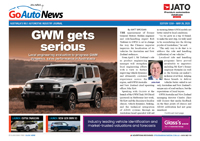 1 Apr 2009
1 Apr 2009
ARGUABLY the most important new-car release of 2009 was the second-generation Mazda3.
Prices went up slightly, but so did cabin space, refinement, performance, safety, equipment levels, economy and efficiency A return to the original Mazda3 model nomenclature saw the Neo Sport revert to Neo, Maxx come back, Maxx Sport carry on and SP23 turns SP25 to reflect a larger powerplant.
Two body styles were offered from the start, again in four-door sedan and five-door hatch guises.
Mazda claimeds better aerodynamics helped quell noise, vibration and harshness issues, while increased suspension rigidity, better placement of vibration-dampening material and beefed-up body and panel rigidity also made the small car quieter.
Improved interior quality was another Mazda goal, and this manifested itself in the use of soft-grained materials on high-visibility areas such as the top of the dashboard, while the cabin’s join lines were also slimmer.
A revised 2.0-litre twin-cam four-cylinder engine producing 108kW of power at 6500rpm and 182Nm of torque at 4500rpm motivated all petrol Mazda3s bar the sports models.
A six-speed manual usurped the old five-speeder, while four gave way to five-speeds in the automatic.
Using 91 RON unleaded petrol, the manual model’s fuel consumption fell 0.3L/100km to 7.9L/100km, while the auto’s 8.2L/100km result was 0.2L/100km lower than before.
Also on the descent were the Mazda3’s carbon dioxide emissions, at 193g/km instead of 199g/km.
As its name suggests, the SP25’s engine was a 2.5-litre unit. This twin-cam 16-valve S-VT variable-valve powerplant was similar to the Mazda6’s item, and produced 122kW at 6000rpm and 227Nm at 4000rpm.
Mazda called the carryover MacPherson strut and multi-link rear suspension systems “newly evolved”, with widespread modifications and alterations to help achieve an improved handling/ride balance.
A revised electro-hydraulic set-up helped cut fuel consumption and Mazda claimed less effort was required to turning the wheel.
In July 2009 the hot MPS variant was introduced, with an almost identical turbocharged four-cylinder engine and the same basic suspension architecture as the previous model, but with changes to try to cure the torque steer that blighted the old car.
Unlike the previous-generation's subtle 'sleeper' looks, muscular styling comprising a prominent bonnet scoop, large roof-mounted rear spoiler and unique pumped-out front guards clearly distinguished the MPS from the standard models.
The 2.3-litre direct-injection turbocharged four-cylinder engine, paired with a carryover six-speed manual, produced an unchanged 190kW at 5500rpm and 380Nm at 3000rpm, providing 0-100km/h in just 6.1 seconds, with slightly reduced fuel consumption and CO2 emissions.
A The manual-only 2.2-litre common-rail diesel engine arrived in November 2009 delivering fuel consumption of 5.7 litres per 100km, making it the most fuel-efficient model in the Mazda range, even ahead of the 1.5-litre petrol Mazda2 light car.
Outputs of the revised and enlarged diesel engine were 110kW of power at 3500rpm and 360Nm of torque at 1800rpm, netting a 1.7-second reduction in acceleration time from 50km/h to 100km/h, while combined fuel consumption went down from 6.0L/100km to 5.7L/100km and emissions reduced from 160g/km to 150g/km.
The Mazda3's mid-life makeover of September 2011 was highlighted by the addition of a mid-range Mazda3 SP20 SkyActiv, boasting class-leading petrol fuel economy of 6.1 litres per 100km, sprightly 113kW power and Mazda's first attempt at idle-stop technology.
Body design changes included a new front bumper said to improve aerodynamic flow, along with a fresh rear bumper treatment that was 30mm shorter, new 15- and 16-inch alloy wheel designs, and new seat trim and silver highlights in the cabin.






























